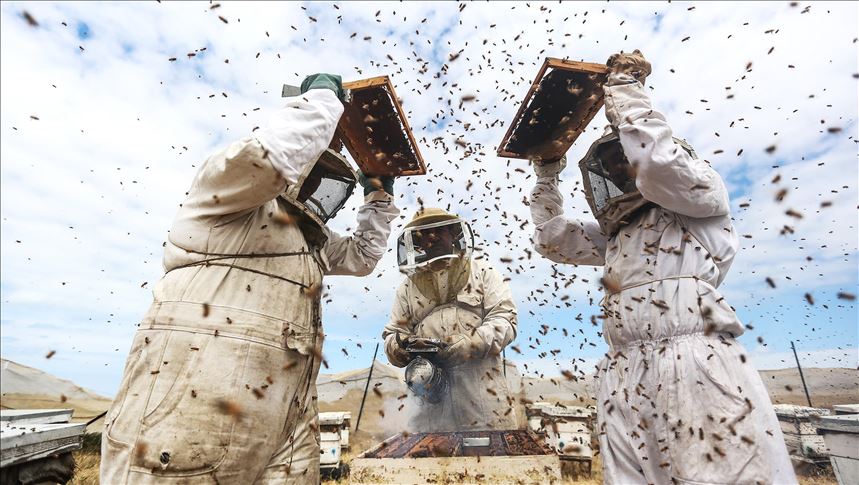
ANKARA
Turkey is the world’s second largest beekeeping country after China, an official said, as the country marks World Bee Day on Monday.
"Turkey is one of few self-sufficient countries in beekeeping,” Selcuk Solmaz, head of Ankara Beekeepers Association (ABA), said in an interview with Anadolu Agency.
Founded in 2003, ABA aims to train beekeepers, discuss difficulties of the profession and find solutions to produce various bee products in more fertile and high quality way, Solmaz explained.
Solmaz said Turkey is also one of few countries with varied honey plants and premium quality honey production.
“Turkish honey is becoming sought after in the world cuisine,” he said, added: “The variation also covers the chestnut, thyme, citrus, pine, lavender, acacia, highland plant and wildflower honey.
“Recently, beekeepers in Turkey started producing royal jelly, pollen, propolis and bee venom,” he added.
Solmaz said there are about 118,000 beehives in Turkey’s capital Ankara, compared to around 50,000 in 2003.
“This shows that the beekeeping sector is developing day by day,” he said.
Contribution to economy
According to the Turkey’s statistical authority TurkStat, the country produced 107,920.097 tons of honey in 2018 and exported 5,912 tons in the same period.
He stressed Turkey is not a fully industrialized country, saying: “It’s also beneficial for organic and clean agriculture.”
Solmaz said bees are directly related to food safety, sustainable agriculture and bio-diversity.
“According to a research carried out by Science And Policy For People And Nature [IPBES] in 2016, food production by means of pollination and insemination costs around $235-$577 billion annually,” he noted.
“If the bees vanish, many living creature will also vanish,” he said, adding: “If we want to live, if we want our children and grandchildren live, we have to show greatest effort to keep the bees alive.”
He said beekeeping should be done not only to preserve the ecosystem, but also for a better use of plants with short lifespan.
The United Nations designated 20 May as World Bee Day to raise awareness of the importance of pollinators, such as bees, butterflies and hummingbirds, the threats they face and their contribution to sustainable development.
Anadolu Agency website contains only a portion of the news stories offered to subscribers in the AA News Broadcasting System (HAS), and in summarized form. Please contact us for subscription options.

